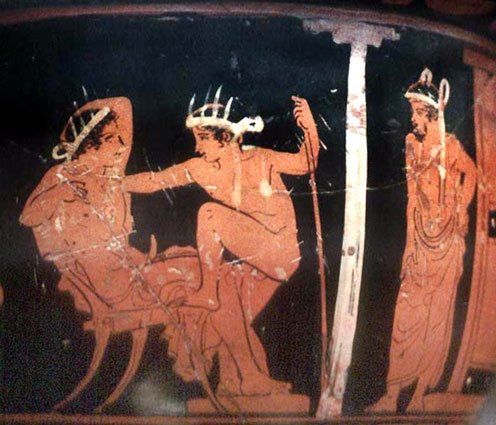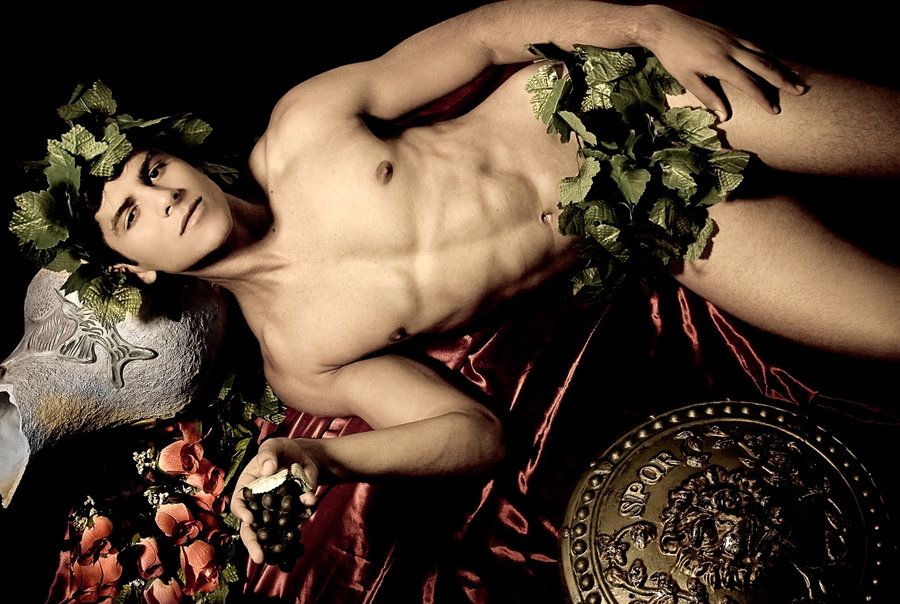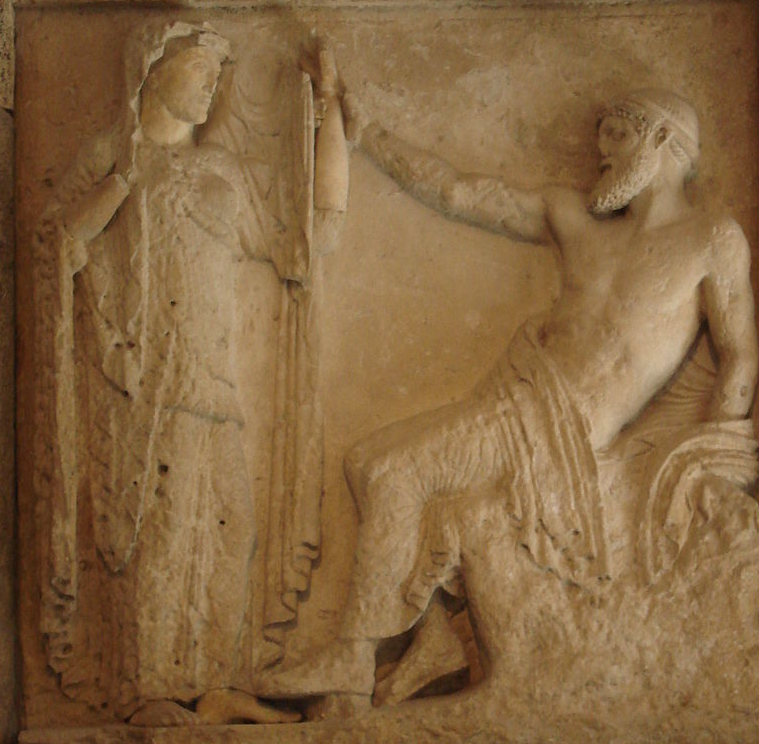Words and Sexual Terms from Greek Mythology
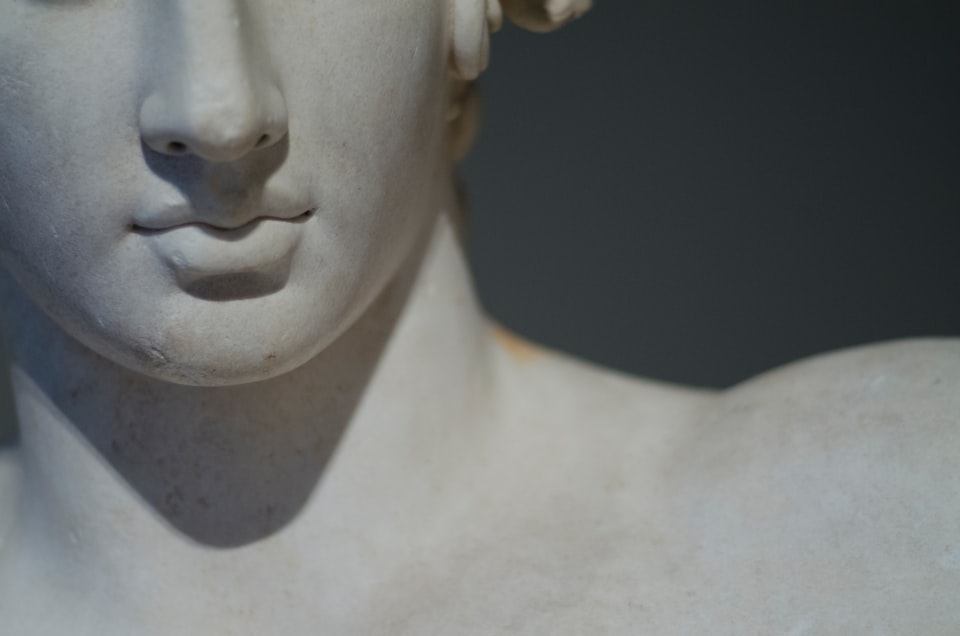
There are quite a few sayings and words derived from Greek mythology that we still use today. I put together this little collection of those related to sex and love:
Adonis
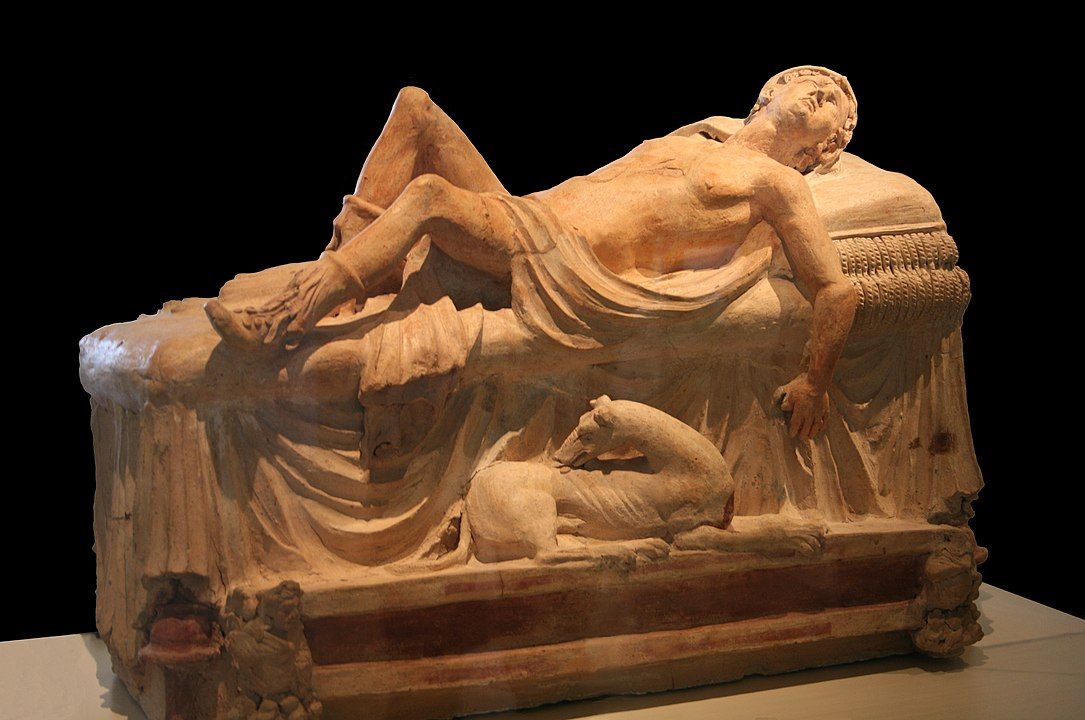
Adonis was so sexy, the goddesses Aphrodite and Persephone fought over him. And the goddesses were not the only ones interested in beautiful Adonis: Apollon, Dionysos, and Herakles all had a thing for the good-looking young man.
He was killed by a boar, in some versions a shape assumed by Aphrodite's jealous lover Ares or Apollon who was enraged that Aphrodite had blinded his son for seeing her in amorous embrace with Adonis.
Herakles' death also has something to do with Adonis in one version of the myth: Aphrodite, furious about Herakles seducing her lover, taught the centaur Nessos the way to kill the hero.
Today, we still use the name of Adonis to refer to a very attractive member of the male sex.
Androgynous
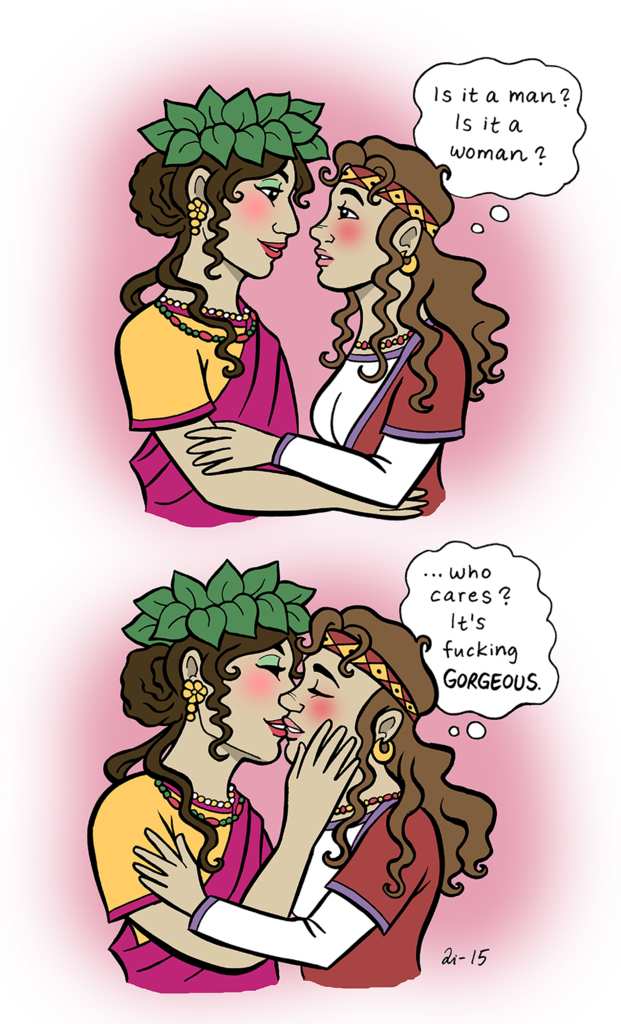
Androgynos is a word in ancient Greek that is applied to a person doing both active, male things and passive, female ones, specifically concerning sexual intercourse.
It seems to have mainly been used in a derogatory manner for effeminate men.
The god Dionysos, often depicted as an effeminate young man, is said to be androgynos, having a penchant for wearing women's clothing and perfume, but the word also implies that he likes to be fucked in the arse. Our sweet Adonis, who had sexual relations with Apollon and Aphrodite, among others, was also called androgynos because he acted "as a man for Aphrodite and a woman for Apollon".
Today, the word androgynous has lost its sexual connotaton but still relates that someone is of indeterminate sex or to a feminine man or a masculine woman. So it has pretty much preserved its original meaning over millenia.
Aphrodisiac

An aphrodisiac is, of course, a substance that is supposed to increase the libido or sex drive when consumed. It was named by the ancient Greeks for the goddess of love and lust, Aphrodite.
The ancient Greek word is ἀφροδισιακόν, aphrodisiakon, derived from aphrodisios, "pertaining to Aphrodite".
Today, certain food is said to be an aphrodisiac just like it was in ancient times. Just look at all the cook books on this topic! Chocolate would only come to Greece after Europe made contact with the American continent, though. The ancient Greeks had to make do with saffron, pomegranate juice and lentil beans.
I hope it's needless to say that the results of most aphrodisiacs are just due to the placebo effect.
Catamite

The English word "catamite" derives from the Latin Catamitus, a corruption of the Greek name Ganymede or Ganymedes (Γανυμήδης).
The modern meaning of "a boy kept for homosexual practices" is closely related to the myth of Ganymedes, a beautiful boy who was abducted by Zeus to serve as his lover and cup bearer for all eternity.
Hence a handsome cup bearer was called "Ganymedes" (or "Catamitus") in ancient times and the word was used affectionately (unless directed at a grown man). Ganymedes appears throughout Roman literature as the archetype of the beautiful, sexually desirable male slave.
Circe
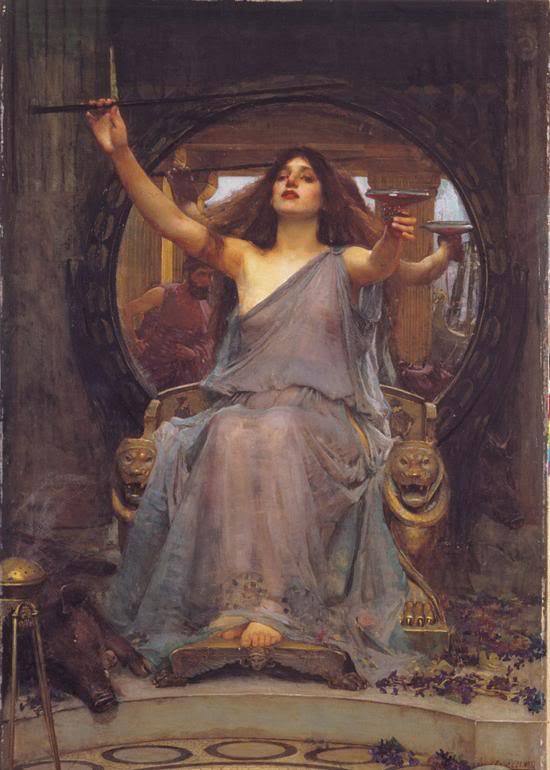
Circe is the sorceress who turned Odysseus' crew into swine when he came upon her island on his arduous journey.
With the help of Hermes, Odysseus avoided the fate of his crew and the loss of his manhood, which Hermes claimed the enchantress would have stolen unless he made her swear by the gods not to do it.
Circe is maybe the original femme fatale, a beautiful and alluring but treacherous and dangerous woman who will not hesitate to steal your cock under the pretense of sweet love-making.
Today, Circe is used in synonym with temptress, siren, and the aforementioned femme fatale.
In some languages, Circe also became a verb with the meaning "to blind someone with your charms", like the enchantress did.
Erotic(a)
Unlike the origins of pornography, erotic and erotica are really derived from Greek myth, namely from Eros, god of love and sexual desire.
Hermaphrodite

Hermaphroditos, as his name plainly reveals, is the son of Hermes and Aphrodite. According to some, he was born with both genitalia, other sources say he was born male but attracted the love of a Naiad nymph and their two forms were merged into one. Neither a man nor a woman, he is both.
Therefore, Hermaphroditos is depicted with both, male and female features, usually female thighs, breasts, and hairstyle, and male genitalia.
He is the god of marriage, hermaphrodites and of effeminates and belongs to the winged love-gods known as Erotes, also sons of Aphrodite like Eros and Anteros.
Today, the word hermaphrodite is a biological term for an organism that has complete or partial reproductive organs and produces both, eggs and sperm. Historically, the word hermaphrodite has also been used to describe ambiguous genitalia. The word intersex has come into preferred usage for humans, as the word hermaphrodite is supposedly misleading and stigmatizing.
Read more about the mythology of Hermaphroditos here!
Nymphomania

A nymph is a minor goddess or spirit bound to a particular location. There are dryads who live in trees, like the one comforting Dionysos in "Taken by Greek Gods: Dionysos and Aura", oreads who live in the hills and mountains, naiads who live in freshwater, and nereids who live in the sea. They are usually depicted as beautiful, nubile young women who love to dance and sing and fuck. Their sexual freedom stands in stark contrast to the restricted lives of wives and daughters in the Greek polis who were supposed to be chaste and faithful (not that they always were...).
Nymphs were also a part of the retinue of Dionysos and Pan, or the huntress Artemis. The latter were required to remain chaste, though, lest they were kicked out by the virgin goddess.
Because of their attractiveness, nymphs were frequently the target of amorous satyrs and gods alike. Their attention was not always appreciated, but in general the nymphs happily made love to men or women freely and without care.
The Greek word nymphe (νύμφη) does not refer to the lustful deities in particular, but is used primarily for a "nubile young woman, bride, young wife", a young women at the peak of her sexual attractiveness, contrasting with the word parthenos (παρθένος), "a virgin (of any age)", and kore (κόρη < κόρϝα), a "maiden, girl". Unlike today, the ancient Greeks viewed women as more libidinous than men because sex doesn't stop for them after the (first) orgasm. The insatiable young wife was a popular trope in Greek and Roman comedy.
Today, nymphomania describes extremely frequent or suddenly increased libido in women. The word is no longer in use by healthcare professionals who use the unisex term hypersexuality instead, but it's still a known word with a rather derogatory baggage.
Porn(ography)

This is a bit of a cheat on my part - the word porn originates in ancient Greek culture, but not in Greek mythology. I can make the case that allegedly there were sacred prostitutes in the service of Aphrodite, who is also the goddess of prostitution, but it'd still be ancient culture rather than mythology. But I just wanted to include this word anyway :-)
The Greek word porneia is the root of the English terms porn, pornography etc. It is derived from Greek pernemi (πέρνημι), "to sell", as a pornē was a type of prostitute in ancient Greece. Pornai were the lowest kind of prostitute, but their profession was considered a source of income just like any other. They could be male (pornoi) or female (pornai). The price is often said to be "an obolos", which was 1/6 of a drachma as well as a proverbial coin of low value or a good bargain. The cheapest sex position was called kubda a rear-entry position with both partners standing or, more kolloquial, "bent over in the street".
The modern word pornography thus means "writing about prostitutes", even though it's used for visual media much, much more than for writing.
Priapism

Priapism is named for the rustic god Priapos, a son of Aphrodite who was cursed with an oversized, constant erection by Hera when he was still in Aphrodite's womb. But despite his permanently erect penis, he could not sustain the erection when the time came for sexual intercourse. His father varies from source to source, but Greek historian Diodorus Siculus makes a compelling argument that inspired me to write "Taken by Greek Gods: Aphrodite's Boy Toy":
"Now the ancients record in their myths that Priapos was the son of Dionysos and Aphrodite and they present a plausible argument for this lineage; for men when under the influence of wine find the members of their bodies tense and inclined to the pleasures of love."
Today, we remember Priapos by using his name to refer to a condition in which the penis remains erect for hours in the absence of stimulation or after stimulation has ended.
Satyrism

A satyr is a nature spirit akin to the nymph, inhabiting woodlands, mountains, and pastures. Originally, satyrs had the ears and tail of a horse, sometimes also the legs. Later they began to acquire goat-like characteristics with the legs and horns of goats. Since the Renaissance, satyrs have been most often represented with the legs and horns of goats and lost their horse features.
Satyrs are libido-driven creatures in Greek mythology, usually depicted naked with oversized erections and often attempted to seduce or rape nymphs and mortal women alike, but thankfully with little success. They are also shown masturbating or engaging in bestiality.
Despite their ridiculous appearance, satyrs were also thought to possess useful knowledge. The wise old satyr Silenos was the tutor of young Dionysos when he was still a demigod and the satyrs remained his faithful companions when he ascended to godhood.
In modern times, their notorious sex-drive gave rise to the term satyrism for extremely frequent or suddenly increased libido in men, the spear counterpart to nymphomania. Healthcare professionals use the unisex term hypersexuality for both sexes today.
to tantalise

Tantalos, who was welcomed to the feast of the gods of Olympos, took advantage of their hospitality and stole nectar and ambrosia, the food of the gods to bring to the humans. He also gossiped about the secrets of the gods he heard at their table.
But his truly wicked deed for which he deserves to be thrown into Tartaros is the serving of his own son, boiled and cut up in a banquet he threw for the gods. The gods saw through this gruesome deception and refused to eat, except for Demeter who was distraught by the loss of her daughter Persephone at the time and ate a part of the boy's shoulder.
The Fates brought the boy back to life and the gods gave him a shoulder made of ivory by the divine smith Hephaistos himself. Poseidon wanted him to live on Mount Olympos, but he was thrown out by Zeus because of his anger at Tantalos.
Tantalos himself was thrown into Tartaros, the deep abyss that is used by the gods of Olympos as a dungeon of torment and suffering for the wicked. His punishment for his acts was to stand in a pool of water beneath a fruit-bearing tree with low-hanging branches. But whenever he reached for the fruit, the branches raised them just short of his grasp. And whenever he bent down to get a drink, the water receded before he could get any.
Today, the word "tantalise" stands for temptation without satisfaction, for the torment of someone with the sight or promise of something that is unobtainable, akin to the fate of Tantalos in Tartaros.
Did you enjoy this article? Subscribe or join my Patreon for more non-fiction articles like this one.
Find my mythology erotica here!
